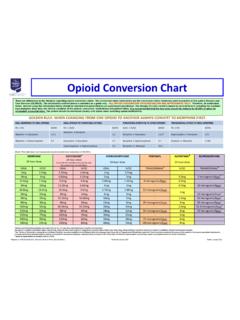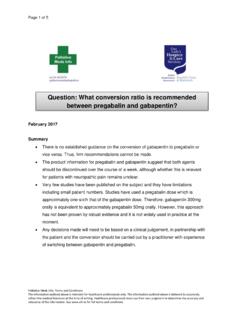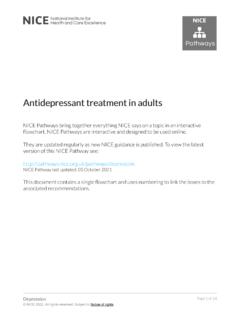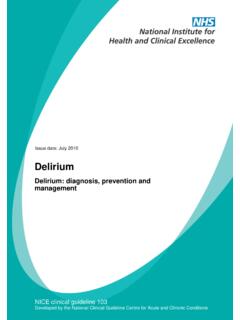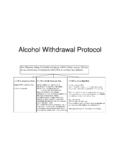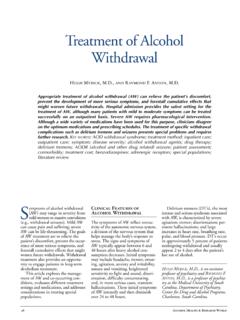Transcription of Question: What are the treatment options for hiccups in ...
1 1 Palliative Meds Info: Terms and Conditions The information outlined above is intended for healthcare professionals only. The information outlined above is believed to accurately reflect the medical literature at the time of writing. Healthcare professionals must use their own judgment to determine the accuracy and relevance of the information. See for full terms and conditions. September 2011 1. Background A hiccup is a repeated involuntary spasmodic contraction of the diaphragm followed by a sudden closure of the glottis which checks the inflow of air and produces the characteristic sounds. hiccups result when afferent or efferent nerves to the muscles of respiration, or the medullary centres controlling these muscles are irritated. The underlying pathophysiology of intractable hiccups remains to be elucidated, but is believed to involve organic, drug-induced, and/or psychological causes.
2 1 There are close to a hundred causes for singultus ( hiccups ),2 the most common causes of which are hiccups are classified according to their duration: Acute hiccups are defined as hiccups that last up to 48 ,3 Persistent hiccups are hiccups that last for over 48 ,3 Intractable hiccups are defined as hiccups that last more than one month3 or two months2. Intractable hiccups may result in severe discomfort, decreased physical strength, mental depression, and possibly death, if left Question: What are the treatment options for hiccups in palliative care patients? 2 Palliative Meds Info: Terms and Conditions The information outlined above is intended for healthcare professionals only. The information outlined above is believed to accurately reflect the medical literature at the time of writing.
3 Healthcare professionals must use their own judgment to determine the accuracy and relevance of the information. See for full terms and conditions. Some drugs that are used to treat hiccups can also induce Drug-induced causes include benzodiazepines, corticosteroids, antibiotics, opioids, and cytotoxic 2. The pharmacological treatment of hiccups The pharmacological management of hiccups is based on case studies and clinical anecdote and deciding which medication to use will include consideration of potential side-effects. 4 The information outlined below relates only to the pharmacological management of hiccups . The management of acute or persistent hiccups and the management of intractable hiccups are discussed. Acute or Persistent hiccups The treatment of hiccups should address the specific There are many times when the cause of hiccups cannot be identified or addressed, and in these cases general measures/treatments should be ,3 (Detailed information on the treatment options is available in section ) Pharyngeal Stimulation Nebulised saline (2mls over 5 minutes).
4 5 Reduce Gastric Distension Peppermint Water Peppermint water facilitates belching by relaxing the lower oesophageal Peppermint water may have to be extemporeously prepared for the patient. It may be difficult for patients to source in the community. Antiflatulent5, Simethicone 25mg (Maalox Plus or Rennie Deflatine Chewable Tablets (both also contain 3 Palliative Meds Info: Terms and Conditions The information outlined above is intended for healthcare professionals only. The information outlined above is believed to accurately reflect the medical literature at the time of writing. Healthcare professionals must use their own judgment to determine the accuracy and relevance of the information. See for full terms and conditions. antacids))6,7 Prokinetic Metoclopramide 10mg tightens the lower oesophageal sphincter and hastens gastric ,5 Peppermint water and metoclopramide should not be used Gastro-oesophageal reflux: Prokinetic metoclopramide 10mg and/or H2-receptor antagonist or Proton Pump Inhibitor (PPI).
5 2 Diaphragmatic irritation or other cause: Baclofen 5-20mg three times daily orally (occasionally more).2 Nifedipine 10-20mg three times daily orally (occasionally more).2 Haloperidol at night Sodium valproate, aim for 15mg/kg/24h in divided Midazolam 10-60mg/24h by CSCI if all else Central suppression of the hiccup reflex The blockade of dopamine or the potentiating of GABA can cause central suppression of the hiccup Dopamine antagonists: 4 Palliative Meds Info: Terms and Conditions The information outlined above is intended for healthcare professionals only. The information outlined above is believed to accurately reflect the medical literature at the time of writing. Healthcare professionals must use their own judgment to determine the accuracy and relevance of the information.
6 See for full terms and conditions. Metoclopramide (as above).2 Haloperidol 5-10mg PO or IV if no Chlorpromazine 10-25mg PO or IV if no GABA agonists: (as above) Sodium valproate 200-500mg Intractable hiccups Evidence supporting drug treatment for intractable hiccups remains Due to the relatively rare occurrence of intractable hiccups , most of the documented cases are single case reports or retrospective case If intractable hiccups remain resistant to non- pharmacological techniques, the strongest evidence to date supports the use of chlorpromazine 25 to 50 mg administered intravenously, with a second dose within 2 to 4 hours intravenously or The patient should be monitored carefully for anticholinergic side effects, particularly sedation. 1 If chlorpromazine fails to control intractable hiccups , nifedipine, metoclopramide, baclofen, or sodium valproate may be considered.
7 1 A significant number of medicines have been associated with the treatment of hiccups . Only the most common medicines are discussed below. Chlorpromazine Dose: Chlorpromazine 10-25mg PO or IV if no response. 2 Chlorpromazine, a dimethylamine derivative of phenothiazine, acts centrally by dopamine antagonism in the Chlorpromazine is the only drug licensed for the treatment of Chlorpromazine has been considered the drug of choice for intractable hiccups . However, chlorpromazine can cause drowsiness, faintness, palpitations, and tachycardia even in a single dose. 1 5 Palliative Meds Info: Terms and Conditions The information outlined above is intended for healthcare professionals only. The information outlined above is believed to accurately reflect the medical literature at the time of writing.
8 Healthcare professionals must use their own judgment to determine the accuracy and relevance of the information. See for full terms and conditions. Metoclopramide Dose: Metoclopramide 10mg four times daily Metoclopramide may reduce the intensity of oesophageal Metoclopramide has been utililised for at least 20 years and is often effective for termination of hiccup , most likely through central dopaminergic Baclofen Dose: Baclofen 5-20mg three times daily orally (occasionally more).2 Baclofen, a gamma-amino butyric acid (GABA) analogue that activates an inhibitory neurotransmitter is thought to aid in blocking the hiccup Baclofen should be used with extreme caution in patients with renal It may not be well tolerated in the elderly due to the frequent occurrence of ataxia, delirium , dizziness and Nifedipine Dose: Nifedipine 10-20mg three times daily orally (occasionally more).
9 2 Nifedipine, a calcium channel blocker, may play a role in reversing the abnormal depolarization in the hiccup reflex It has been reported to terminate persistent hiccups but has a propensity for inducing hypotension, which may be especially severe in volume contracted patients or those receiving Midazolam Dose: Midazolam 10-60mg/24h by CSCI. 2 It has been successfully utilized in patients with terminal hiccups . Midazolam infusion may be especially useful if intractable hiccups occur in the setting of refractory terminal delirium or 6 Palliative Meds Info: Terms and Conditions The information outlined above is intended for healthcare professionals only. The information outlined above is believed to accurately reflect the medical literature at the time of writing. Healthcare professionals must use their own judgment to determine the accuracy and relevance of the information.
10 See for full terms and conditions. Haloperidol Dose: Haloperidol 5-10mg PO or Haloperidol, a dopamine antagonist, may be useful in patients with concurrent agitated delirium , but monitoring for extrapyramidal symptoms is Methylphenidate The neurostimulant methylphenidate may terminate hiccups through inhibition of dopamine and the inhibition of norepinephrine uptake. Patients with concurrent depression or opioid-induced sedation may be good candidates for methylphenidate treatment of Mar chal et al report a case study of a 56-year-old man with metastatic small-cell lung cancer, a persistent hiccup was refractory to classic treatments. Methylphenidate was started at 10mg once daily. It was rapidly efficient and well Nefopam It is a non-opioid analgesic structurally related to antiparkinsonian and antihistaminic medications, intravenous nefopam has been reported to abruptly terminate hiccups in three patients with refractory hiccups , one of whom had acute leukaemia.
